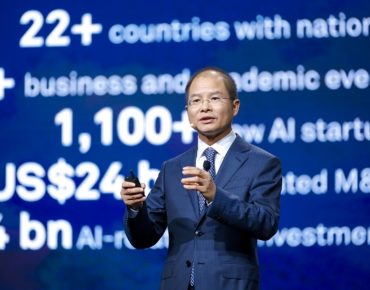New AI Chips from Huawei for Data Centers, Devices

Huawei Rotating Chairman Eric Xu
Even as technology stocks fell off the market cliff this week, the march of technology innovation and product launches goes on. Tech giant Huawei has thrown a new chip into the rapidly expanding processor ring with AI chips for data centers and smart devices, putting the company in direct competition with AI processor makers Nvidia and Qualcomm.
Huawei’s Ascend chips series, launched in Shanghai at the Huawei Connect conference, were touted by the company as the world’s first AI IP and chip series that natively serves a range of AI scenarios, “providing optimal TeraOPS per watt…in every scenario, whether it’s minimum energy consumption or maximum computing power in data centers,” adding that Huawei’s “unified architecture also makes it easy to deploy, migrate, and interconnect AI applications across different scenarios.”
Huawei said its “full stack” AI portfolio refers to Huawei chips, chip enablement, a training and inference framework and application enablement, and that the stack supports a range of deployment scenarios for AI, including public clouds, private clouds and edge computing across industrial IoT devices and consumer devices.
 “Within Huawei, we will continue exploring ways to improve management and efficiency with AI,” said Eric Xu, Huawei rotating chairman, at the Shanghai event. “In the telecom sector, we will adopt SoftCOM AI to make network O&M more efficient. In the consumer market, HiAI will bring true intelligence to our consumer devices, making them smarter than ever. Our Huawei EI public cloud services and FusionMind private cloud solutions will provide abundant and affordable computing power for all organizations – especially businesses and governments – and help them use AI with greater ease. Our portfolio will also include an AI acceleration card, AI server, AI appliance, and many other products.”
“Within Huawei, we will continue exploring ways to improve management and efficiency with AI,” said Eric Xu, Huawei rotating chairman, at the Shanghai event. “In the telecom sector, we will adopt SoftCOM AI to make network O&M more efficient. In the consumer market, HiAI will bring true intelligence to our consumer devices, making them smarter than ever. Our Huawei EI public cloud services and FusionMind private cloud solutions will provide abundant and affordable computing power for all organizations – especially businesses and governments – and help them use AI with greater ease. Our portfolio will also include an AI acceleration card, AI server, AI appliance, and many other products.”
The 7 nanometer Ascend 910 chip, designed for the data center servers, will enable Huawei for the first time to install chips of its own making in its servers, according to a published article from Reuters, and has double the throughput of Nvidia’s v100, according to the company.
The Ascend processors support the government of China’s policy of encouraging domestic semiconductor development and adoption and comes amid increasing trade and technology tensions with the United States, including a news report from Bloomberg last week alleging that Supermicro motherboards exported from China to the U.S. market were bugged by operatives from the People’s Liberation Army.
The Reuters story noted that Huawei is barred from selling telecom equipment in the United States and that Australia banned the company last August from exporting gear for its planned 5G mobile network. Huawei denies the hacking accusations.











